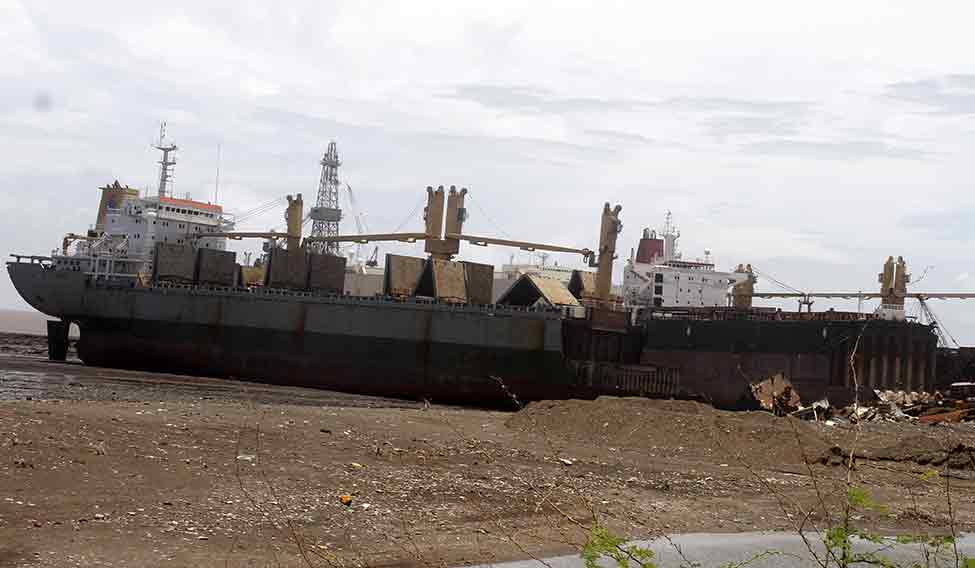Mukesh Paswan, 36, gets a one-hour lunch break during which he has to have a hurried lunch and rest before resuming work as a gas cutter in Alang Sosiya, Asia’s largest ship recycling yard, 50 kilometres from Bhavnagar in Gujarat. He lives in the yard, in a small tin shed that he shares with another worker. Most of the 20,000 workers living in Alang don’t have access to electricity but amenities like electricity and water aren’t Paswan’s first concern. It is the money he gets at the end of the month which he can send to his family in Baliya, Uttar Pradesh. He gets Rs 350 for working eight hours a day and additional for overtime. In a month, he earns between Rs 11,000 and Rs 12,000 of which he keeps only Rs 5,000 for his expenses.
There are more than 140 plots in Alang owned by ship breakers. The government gets crores of rupees as revenue from the ship breaking industry and over the years, working and safety conditions have improved on the plots.
“There are no gardens and no electricity means no television for the workers,” says Dharmendrasinh Gohil, a social worker from Mandva, five kilometres from Alang. “Availability of water is also irregular and workers often have to go to hand pumps and other public sources at different locations.” Many of the workers come to the small hotel he owns and vent out their frustrations.
Defecating in the open is a common practice here. “We do have common toilets but they are in bad shape,” says Lalmohammad Khan, 40, another worker. Pravin Parmas is luckier than most other workers as he stays in a home with access to basic amenities 11 kilometres away in Piprala. “A person has to earn to live,” he says. “It is sheer helplessness. Or why would one work in a place where everything is dictated according to the whims and fancies of the plot owners?”
Despite precautions being taken, the ship breaking yard is one of the most dangerous places to work in, says R.M. Ram Patel, vice president of Alang Sosiya Recycling and General Workers Association, which has ensured that the workers are covered under the Employees' State Insurance Corporation scheme. Alang has witnessed 450 deaths in accidents and fires since 1983. Haresh Parmar, joint secretary of the Ship Recycling Industries Association and a plot owner, says that although there have been no deaths due to fires in the last three years, in case of a disaster, Alang doesn’t have a proper hospital. The injured will have to be taken to Bhavnagar as the 25-bedded Alang Hospital and the Red Cross Hospital are hardly enough to handle disasters. We have everything possible at a taluka level including oxygen concentrators but still, prevention is better than cure, says Dr Amin Hamidani of Alang Hospital. The workers don’t take enough precautions to ensure their own safety and health, he feels. He cites the example of a worker whose platelet count was as low as 64,000 but insisted he needed to go back to work. “It is difficult even to convince workers to have a bath after work,” he says.
The workers are also facing a peculiar problem. Despite the ship breakers helping in building a housing colony for 1,000 workers, only 200 have shown interest in moving in. Some of the workers whom THE WEEK spoke to said that the housing colony was too far from their workplace. “We did propose to have colonies near the workplaces but this did not find favour with the state government,” says Parmar. Families of most of the workers stay back in their home towns of Bihar, Jharkhand, Uttar Pradesh and Odisha. It’s not just the workers but ship breakers, too, are facing problems as the business remains slack. “There is no demand for steel in the market as no new projects are coming up,” says Parmar. “Moreover, the dumping of finished products from China is badly affecting the business.”






